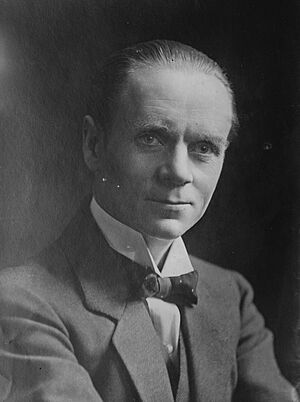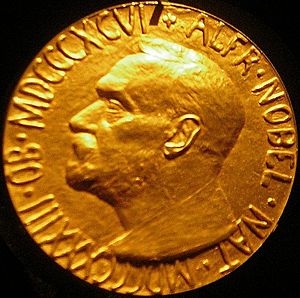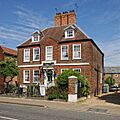Norman Angell facts for kids
Quick facts for kids
Sir
Ralph Norman Angell
|
|
|---|---|
 |
|
| Member of Parliament for Bradford North |
|
| In office 30 May 1929 – 7 October 1931 |
|
| Preceded by | Eugene Ramsden |
| Succeeded by | Eugene Ramsden |
| Personal details | |
| Born |
Ralph Norman Angell Lane
26 December 1872 Holbeach, England |
| Died | 7 October 1967 (aged 94) Croydon, Surrey, England |
| Occupation | lecturer, journalist, author, politician |
| Known for | Nobel Peace Prize (1933) |
Sir Ralph Norman Angell (born December 26, 1872 – died October 7, 1967) was an English writer, journalist, and politician. He won the Nobel Peace Prize in 1933. He was also a Member of Parliament (MP) for the Labour Party.
Angell helped start the Union of Democratic Control. He was part of important groups like the Royal Institute of International Affairs and the League of Nations Union. He was made a Knight in 1931, which means he could use "Sir" before his name.
Contents
Biography of Norman Angell
Norman Angell was one of six children. He was born as Ralph Norman Angell Lane in Holbeach, England. Later, he decided to use only "Angell" as his last name. He went to schools in England, France, and Switzerland. In Switzerland, he even helped edit an English newspaper.
When he was 17, Angell moved to the United States. He worked many different jobs there. He was a vine planter, a cowboy, and even a mail carrier. He also worked as a reporter for newspapers like the St. Louis Globe-Democrat.
In 1898, he returned to Europe. He worked in Paris as an editor for English newspapers. He also wrote about the famous Dreyfus affair for American newspapers. From 1905 to 1912, he was the Paris editor for the Daily Mail.
Angell came back to England in 1914. He helped create the Union of Democratic Control, a group that wanted more public say in foreign policy. In 1920, he joined the Labour Party. He became an MP for Bradford North in 1929 and served until 1931.
In 1931, he was made a Knight for his public work. Two years later, in 1933, he received the Nobel Peace Prize. This award recognized his efforts to promote peace.
From the mid-1930s, Angell spoke out against aggressive countries like Germany, Italy, and Japan. He went to the United States in 1940 to encourage American support for Britain during World War II. He stayed there until his autobiography was published in 1951. He then returned to Britain and passed away in 1967 at the age of 94.
Angell lived alone for the last 55 years of his life. He bought Northey Island in Essex, England. This island is only connected to the mainland at low tide.
His Nobel Prize medal was sold in 1983 for $12,000. Today, it is kept at the Imperial War Museum in London.
The Great Illusion Book
Norman Angell is best known for his 1909 pamphlet, Europe's Optical Illusion. This was later published as the book The Great Illusion. An anti-war film called La Grande Illusion was named after his work.
The main idea of his book was that countries in Europe were so connected through their economies that war between them would be pointless. He argued that if one country conquered another, it wouldn't actually gain wealth. This is because wealth in the modern world relies on credit and business agreements. If these are destroyed by war, everyone loses. He believed that taking over another country's land wouldn't make the conquering country richer.
The Money Game for Learning
Angell also created The Money Game. This was a fun way to teach children about how money and banking work. It was published in 1928 as both a book and a game. The book explained economic ideas, and the game helped kids understand them in a practical way.
Angell's Impact and Ideas
Norman Angell's writings influenced many people. He believed in the "moral obligation to be intelligent." This means he thought it was important for people to think clearly and understand complex issues.
Works by Norman Angell
- (As Ralph Lane) Patriotism under Three Flags: A Plea for Rationalism in Politics (1903)
- America and the New World State (in U.S., 1912)
- War and the Workers (1913)
- The World's Highway (1916)
- The Dangers of Half Preparedness (1916, in U.S.)
- War Aims: The Need for a Parliament of the Allies (1917)
- Why Freedom Matters (1917)
- The Political Conditions of Allied Success: A Protective Union of the Democracies (1918, in U.S.)
- The Treaties and the Economic Chaos (1919)
- The British Revolution and the American Democracy (1919)
- The Press and the Organization of Society (1922)
- If Britain is to Live (1923)
- Foreign Policy and Human Nature (1925)
- Must Britain Travel the Moscow Road? (1926)
- The Public Mind: Its Disorders: Its Exploitation (1927)
- The Money Game: Card Games Illustrating Currency (1928)
- Can Governments Cure Unemployment? (1931, with Harold Wright)
- From Chaos to Control (1932)
- The Unseen Assassins (1932)
- The Great Illusion—1933 (1933)
- The Menace to Our National Defence (1934)
- Preface to Peace: A Guide for the Plain Man (1935)
- The Mystery of Money: An Explanation for Beginners (1936)
- This Have and Have Not Business: Political Fantasy and Economic Fact (1936)
- Raw Materials, Population Pressure and War (1936, in U.S.)
- The Defence of the Empire (1937)
- Peace with the Dictators? (1938)
- Must it be War? (1938)
- The Great Illusion—Now (1939)
- For What do We Fight? (1939)
- You and the Refugee (1939)
- Why Freedom Matters (1940)
- America's Dilemma (1941, in U.S.)
- Let the People Know (1943, in U.S.)
- The Steep Places (1947)
- After All: The Autobiography of Norman Angell (London: Hamish Hamilton, 1951; rpt. New York: Farrar, Straus and Young, 1952).
Images for kids
See also
 In Spanish: Norman Angell para niños
In Spanish: Norman Angell para niños
 | Dorothy Vaughan |
 | Charles Henry Turner |
 | Hildrus Poindexter |
 | Henry Cecil McBay |



